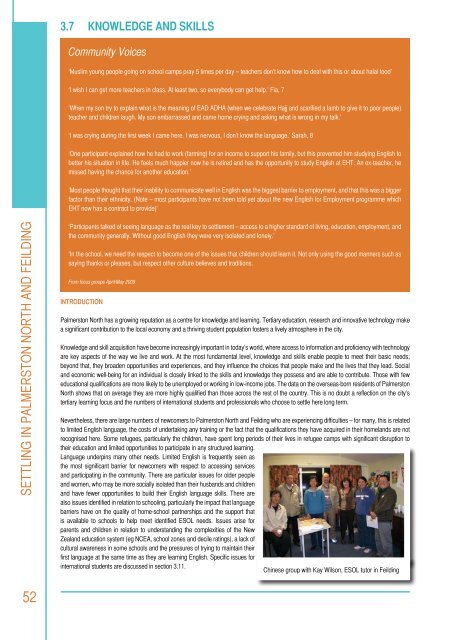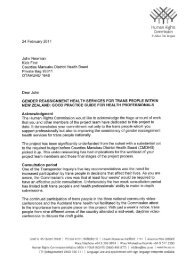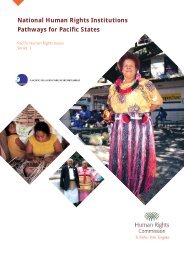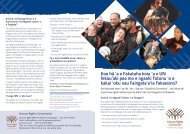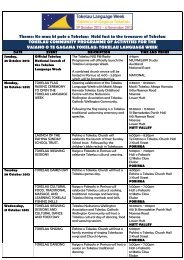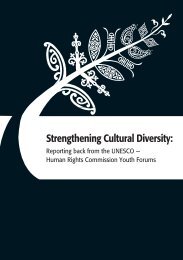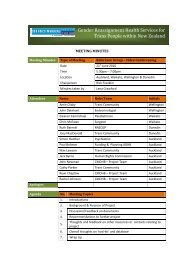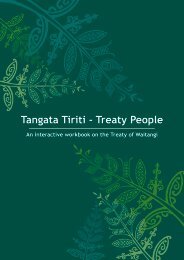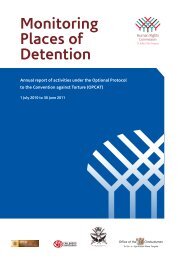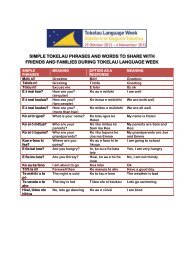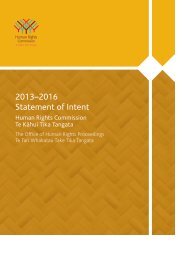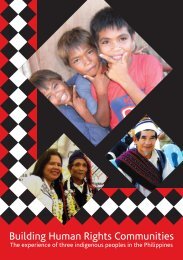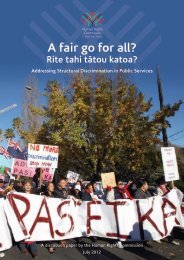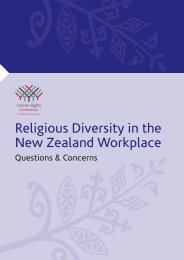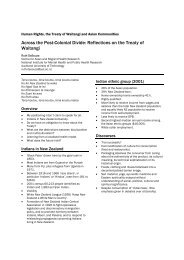Settling In Palmerston North and Feilding - Human Rights Commission
Settling In Palmerston North and Feilding - Human Rights Commission
Settling In Palmerston North and Feilding - Human Rights Commission
You also want an ePaper? Increase the reach of your titles
YUMPU automatically turns print PDFs into web optimized ePapers that Google loves.
3.7 KNOWLEDGE AND SKILLSCommunity Voices‘Muslim young people going on school camps pray 5 times per day – teachers don’t know how to deal with this or about halal food’‘I wish I can get more teachers in class. At least two, so everybody can get help.’ Fia, 7‘When my son try to explain what is the meaning of EAD ADHA (when we celebrate Hajj <strong>and</strong> scarified a lamb to give it to poor people)teacher <strong>and</strong> children laugh. My son embarrassed <strong>and</strong> came home crying <strong>and</strong> asking what is wrong in my talk.’‘I was crying during the first week I came here. I was nervous, I don’t know the language.’ Sarah, 8‘One participant explained how he had to work (farming) for an income to support his family, but this prevented him studying English tobetter his situation in life. He feels much happier now he is retired <strong>and</strong> has the opportunity to study English at EHT. An ex-teacher, hemissed having the chance for another education.’‘Most people thought that their inability to communicate well in English was the biggest barrier to employment, <strong>and</strong> that this was a biggerfactor than their ethnicity. (Note – most participants have not been told yet about the new English for Employment programme whichEHT now has a contract to provide)’SETTLING IN PALMERSTON NORTH AND FEILDING‘Participants talked of seeing language as the real key to settlement – access to a higher st<strong>and</strong>ard of living, education, employment, <strong>and</strong>the community generally. Without good English they were very isolated <strong>and</strong> lonely.’‘<strong>In</strong> the school, we need the respect to become one of the issues that children should learn it. Not only using the good manners such assaying thanks or pleases, but respect other culture believes <strong>and</strong> traditions.From focus groups April/May 2009<strong>In</strong>troduction<strong>Palmerston</strong> <strong>North</strong> has a growing reputation as a centre for knowledge <strong>and</strong> learning. Tertiary education, research <strong>and</strong> innovative technology makea significant contribution to the local economy <strong>and</strong> a thriving student population fosters a lively atmosphere in the city.Knowledge <strong>and</strong> skill acquisition have become increasingly important in today’s world, where access to information <strong>and</strong> proficiency with technologyare key aspects of the way we live <strong>and</strong> work. At the most fundamental level, knowledge <strong>and</strong> skills enable people to meet their basic needs;beyond that, they broaden opportunities <strong>and</strong> experiences, <strong>and</strong> they influence the choices that people make <strong>and</strong> the lives that they lead. Social<strong>and</strong> economic well-being for an individual is closely linked to the skills <strong>and</strong> knowledge they possess <strong>and</strong> are able to contribute. Those with feweducational qualifications are more likely to be unemployed or working in low-income jobs. The data on the overseas-born residents of <strong>Palmerston</strong><strong>North</strong> shows that on average they are more highly qualified than those across the rest of the country. This is no doubt a reflection on the city’stertiary learning focus <strong>and</strong> the numbers of international students <strong>and</strong> professionals who choose to settle here long term.Nevertheless, there are large numbers of newcomers to <strong>Palmerston</strong> <strong>North</strong> <strong>and</strong> <strong>Feilding</strong> who are experiencing difficulties – for many, this is relatedto limited English language, the costs of undertaking any training or the fact that the qualifications they have acquired in their homel<strong>and</strong>s are notrecognised here. Some refugees, particularly the children, have spent long periods of their lives in refugee camps with significant disruption totheir education <strong>and</strong> limited opportunities to participate in any structured learning.Language underpins many other needs. Limited English is frequently seen asthe most significant barrier for newcomers with respect to accessing services<strong>and</strong> participating in the community. There are particular issues for older people<strong>and</strong> women, who may be more socially isolated than their husb<strong>and</strong>s <strong>and</strong> children<strong>and</strong> have fewer opportunities to build their English language skills. There arealso issues identified in relation to schooling, particularly the impact that languagebarriers have on the quality of home-school partnerships <strong>and</strong> the support thatis available to schools to help meet identified ESOL needs. Issues arise forparents <strong>and</strong> children in relation to underst<strong>and</strong>ing the complexities of the NewZeal<strong>and</strong> education system (eg NCEA, school zones <strong>and</strong> decile ratings), a lack ofcultural awareness in some schools <strong>and</strong> the pressures of trying to maintain theirfirst language at the same time as they are learning English. Specific issues forinternational students are discussed in section 3.11.Chinese group with Kay Wilson, ESOL tutor in <strong>Feilding</strong>52


